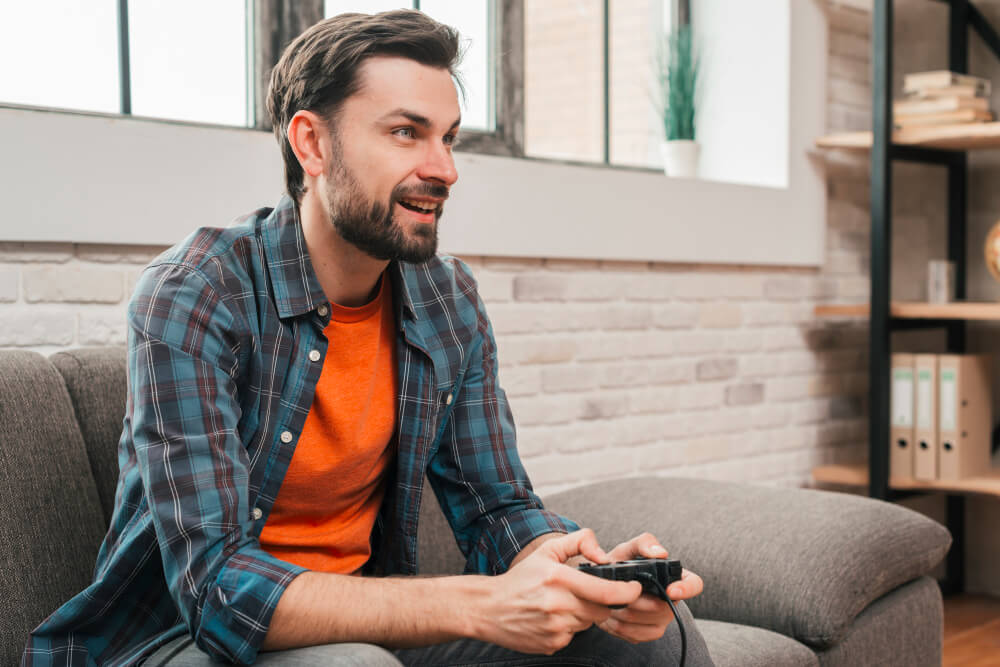– Updated on August 18, 2025

Many parents worry that their kids play video games too frequently. Maybe they’ve asked you, “Five more minutes!” one too many times. However, there is a difference between that and a more concerning video game addiction. You may be wondering how to tell and what you can do about it.
We have created a parents’ legal guide to children’s video game addiction to help you work through this:
What Can I Do if I Think My Child Is Addicted to Video Games?
Knowing the signs of gaming addiction can help you determine your next steps. If your child is exhibiting these behaviors, you may want to talk with them:
- Regularly playing video games instead of completing necessary homework or chores
- Withdrawal symptoms when not playing, e.g., anxiety, mood swings, or sadness
- Prioritizing gaming over relationships or previously enjoyed hobbies
- Attempting and failing to quit playing, even when the gaming is having negative consequences on their life
- Lying about how long they have been playing/excessive gaming
- Spending more each month on game purchases
- Neglecting personal hygiene due to gameplay
- Intense urges to play
- A need to spend longer playing video games to get the same level of enjoyment as before
Are You a Parent Dealing With a Child’s Gaming Addiction?
If your child is exhibiting these behaviors, you may want to:
- Set boundaries: Allow your child to game, but set limits for the day.
- Have an open dialogue with your child about their online game use: Explain to them that you have some concerns about their gaming, but do your best to keep your words, tone, and body language non-judgmental. Ensure that they know you are there for them and that it is a safe space for them to communicate with you about their habits. This could allow you to learn more about why they may be excessively gaming.
- Monitor their use: There are apps available that monitor your child’s daily video game usage. These can help you determine how much time your child spends gaming each day and whether this is an issue. You can also encourage your child to engage in other activities without making them feel guilty.
- Seek counseling: In some cases, you may need to seek counseling and treatment.
While online game addiction is a relatively new issue, there are likely resources available in your area—a quick Google search for “video game addiction support near me” can help. One resource available nationwide is Gaming Addicts Anonymous (GAA), a free support group. You can see their meeting schedule here.
Our team is also available as a resource for you. We won’t stand by while a gaming company profits off your child’s addiction. We can connect you with a video game addiction lawsuit lawyer who can seek justice and compensation on your behalf.
What Do Video Game Addiction Lawsuits Focus On?
While online game addiction lawsuits are still in their infancy, you may be able to hold video game companies liable for purposefully creating addicting games. Many of the lawsuits that have been filed accuse the company of targeting younger users in an attempt to create ongoing consumers. They also allege that these companies failed to warn users of the potential for addiction.
These lawsuits seek medical expenses and other damages related to the addiction.
What Do I Need to Prove to Sue for Video Game Addiction?
If you can prove that your child suffered from any of the following after becoming addicted to games like Roblox, Grand Theft Auto, Fortnite, or Call of Duty, you could have a video game addiction case:
- A diagnosis of video game addiction or a gaming disorder
- A diagnosis of ADHD/ADD or Oppositional Defiant Disorder (ODD)
- Irritability, anxiety, and depression
- An orthopedic injury, including trigger finger, tennis elbow, carpal tunnel syndrome, neck sprain or herniation, gamer’s thumb (called De Quervains’ Tenosynovitis)
- A requirement for an Individualized Education Plan (IEP) or 504 Plan at school
- Needing to be homeschooled (or needing to homeschool your child) to play games
- High blood pressure (hypertension)
- Obesity
- Sleep deprivation psychosis
- A criminal record (e.g., stealing video games, stealing to afford video games)
- A lost education (high school or university dropout)
- Living at home due to an inability to support yourself (e.g., not working or spending your money on games)
- Seizures
- Changes in the brain shown by an MRI or CT scan
- Computer vision syndrome
- Loss of income (Gamer unable to work full-time),
- Gamer Rage/aggression
- Excessive cursing
- Cursing in inappropriate settings (e.g., school or church)
- Losing friends/not making friends/socially withdrawing
- Very poor hygiene due to spending too much time playing
- Prioritizing video gaming over other activities (e.g., sports, hobbies, family time)
- Changes in eating patterns
Our team can help you determine whether you may have a claim against a video game company.
Schedule A Free Case Review!
How Are Video Games Addictive?
Researchers have not yet found out exactly how online games become addictive. However, studies suggest a link between dopamine release and playing video games.
Dopamine is a neurotransmitter that helps us feel pleasure. Essentially, doing something you like releases dopamine as a little reward. As Harvard Health Publishing explains, “That’s why, once we try one of those cookies, we might come back for another one (or two, or three).”
Addiction can occur when someone continually seeks that dopamine hit and needs to play longer and longer to get that same feeling.
Call Our Team Today to Take Action for Your Child’s Video Game Addiction or Gaming Disorder
If your child’s excessive gaming has created issues in their life and yours, we want to connect you with a lawyer who can seek compensation on your behalf. Video game and gaming console companies should not be allowed to develop purposefully addictive content for vulnerable users. We won’t stand by and let it happen. Get legal help with your child’s online gaming addiction today.
Call The Goldwater Law Firm today for a free consultation.

The Goldwater Law Firm is on mission to help as many people as possible with the fierce, compassionate legal aid only The Gold Standard of Injury Law can offer. If you suffered serious side effects or were diagnosed with an illness because of a defective drug or product, or if you were injured in an accident that wasn’t your fault, Attorney Bob Goldwater and the Goldwater Law Firm is ready to serve as your compassionate partner in the fight to seek the compensation and justice you deserve.
Share this post:





